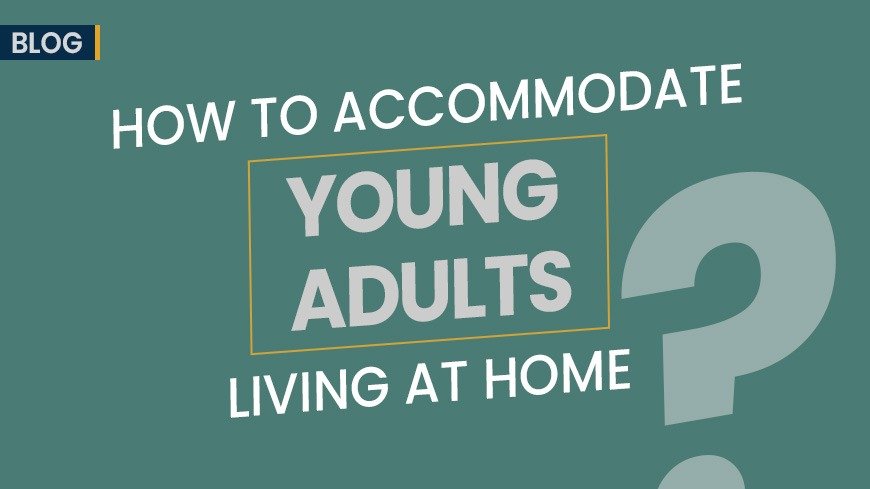- November 7, 2023
- Posted by: Muhammad Shehzad
- Category: Blogs

Introduction
The journey of parenting is a complex and ever-evolving one, filled with numerous phases and challenges. As children grow, they begin to seek independence, and many choose to stay at home while pursuing their education or starting their careers. Accommodating young adults living at home can be a rewarding experience if approached with empathy, understanding, and open communication.
In this blog, we’ll explore how to create a cheerful living arrangement for both parents and young adults during this transitional phase.
Establish Clear Boundaries
Creating a healthy living environment involves setting boundaries. Establish ground rules regarding responsibilities, curfews, shared spaces, and financial contributions if applicable. Be firm but fair in your expectations, and ensure they understand the importance of respecting these boundaries. Consistency is key to maintaining a harmonious household.
Respect Privacy
Young adults living at home often desire privacy and independence. Respect their need for personal space and encourage open discussions about how to balance personal time with family obligations. Create designated areas where they can retreat when they need space, and ask for their input on respecting each other’s privacy.
Financial Planning
Discuss financial arrangements early on. Whether your young adult contributes financially to household expenses or manages their own finances, it’s essential to have a clear understanding of expectations. This conversation can include rent, utilities, groceries, or savings goals. Being transparent about finances can prevent misunderstandings and ensure a smooth living situation.
Read: How Should You Inspect An Apartment Before Purchasing It?
Chore Sharing
Dividing household chores is an excellent way to teach responsibility and cooperation. Create a chore chart that outlines each family member’s responsibilities, and rotate tasks to distribute the workload fairly. This not only keeps the house in order but also encourages young adults to take ownership of their living space.
Encourage Independence
Support and encourage your young adult’s pursuit of independence. Allow them to make decisions and take responsibility for their own lives. This includes managing their schedules, cooking, and even doing their laundry. By fostering independence, you empower them to become self-sufficient adults.
Shared Family Time
While independence is important, don’t forget the value of quality family time. Plan activities that the whole family can enjoy together, such as game nights, movie nights, or shared meals. Creating positive memories strengthens family bonds and helps young adults feel connected and valued.
Flexibility
Flexibility is crucial when accommodating young adults at home. Understand that their schedules, interests, and needs may change over time. Be willing to adjust your expectations and routines as they evolve, and show flexibility when conflicts arise. Adaptability is key to maintaining a harmonious living arrangement.
Emotional Support
Young adulthood can be a challenging and sometimes uncertain phase. Be a source of emotional support for your child. Encourage them to share their dreams, fears, and successes. Offer guidance and advice when requested, but also respect their decisions and autonomy. Your emotional support can make a significant difference in their overall well-being.
Encourage Goal Setting
Help your young adult set and work towards their goals. Whether they’re pursuing higher education, embarking on a career, or exploring their passions, offer encouragement, and assistance when needed. Goal setting can provide a sense of purpose and motivation as they navigate this transitional period.
Create a Positive Environment
Maintain a positive and nurturing environment at home. Encourage open-mindedness, acceptance, and inclusivity. Promote a culture of respect and kindness within the family. This will not only make the living situation more enjoyable but also teach valuable life lessons.
Seek Outside Help When Needed
Sometimes, conflicts or challenges may arise that require external assistance. Don’t hesitate to seek the help of a family therapist or counselor if tensions become overwhelming. Moreover, professional guidance can provide valuable strategies for resolving conflicts and improving communication within the family.
Also Read: 5 Benefits Of Teaming Up In Real Estate Partnerships
Conclusion
Accommodating young adults living at home is an opportunity for growth, learning, and deeper connections within the family. By fostering open communication, setting clear boundaries, and respecting privacy, you can create a harmonious living environment that benefits both parents and young adults.
Remember to support their independence, share responsibilities, and maintain flexibility as their needs and goals evolve. Ultimately, a positive and supportive home environment will help them thrive during this transitional phase, setting the stage for a successful and fulfilling future.
